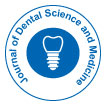Nosso grupo organiza mais de 3.000 Séries de conferências Eventos todos os anos nos EUA, Europa e outros países. Ásia com o apoio de mais 1.000 Sociedades e publica mais de 700 Acesso aberto Periódicos que contém mais de 50.000 personalidades eminentes, cientistas de renome como membros do conselho editorial.
Periódicos de acesso aberto ganhando mais leitores e citações
700 periódicos e 15 milhões de leitores Cada periódico está obtendo mais de 25.000 leitores
Indexado em
- RefSeek
- Universidade Hamdard
- EBSCO AZ
- ICMJE
Links Úteis
Diários de acesso aberto
Compartilhe esta página
Abstrato
Regenerative pulpotomy: A novel strategy for local regeneration of dental pulp
Mobarak A
The major goal of all restorative procedures is to maintain the viability of the dental pulp whenever possible. Over the last few decades, minimally invasive endodontic techniques have been introduced and have received wider acceptance over conventional treatments. These techniques could serve as viable, less invasive, potential treatment options for the management of teeth with inflamed pulps compared to the conventional approach of root canal treatment, preventing unnecessary dental extractions.
Minimally invasive techniques are based on the ability of the remaining radicular pulp to recover following the removal of the infected coronal pulp tissue and placement of a suitable medicament.
Dental pulp stem cells were isolated from irreversibly inflamed pulp tissue, maintaining the potential of cell proliferation and differentiation, Serving as a source of endogenous multipotent cells needed for the regeneration of the pulp-dentin complex. This has changed the general understanding of a clinical diagnosis of irreversible pulpitis and its management, particularly in the era of improved understanding of the healing process and regeneration of the pulp-dentin complex, cases traditionally deemed irreversible may in fact still be savable, thereby shifting the balance of what was irreversible towards reversible, when the correct treatment is applied
Despite these great improvements, various biomaterials have mild to moderate cytotoxic effects when they are placed in direct contact with the pulp tissue, also these techniques itself never lead to the regeneration of pulp or dentin that was lost in the coronal portion.
So a novel strategy for the local regeneration of dentin-pulp complex in the pulp chamber is introduced as “Regenerative Pulpotomy” based on the induction of the outgrowth of pulp cells, capillaries, and neurons from the residual root pulp using a biodegradable autologous scaffold.
Diários por Assunto
- Agro e Aquicultura
- Alimentação e Nutrição
- Bioquímica
- Ciência da Computação
- Ciência de materiais
- Ciencias ambientais
- Ciências Clínicas
- Ciências Farmacêuticas
- Ciências gerais
- Ciências Médicas
- Ciências Sociais e Políticas
- Ciências veterinarias
- Economia e Contabilidade
- Enfermagem e cuidados de saúde
- Engenharia
- Engenheiro químico
- Física
- Genética e Biologia Molecular
- Geologia e Ciências da Terra
- Gestão de negócios
- Imunologia e Microbiologia
- Informática
- Matemática
- Química
Revistas clínicas e médicas
- Anestesiologia
- Assistência médica
- Biologia molecular
- Cardiologia
- Cirurgia
- Dermatologia
- Diabetes e Endocrinologia
- Doenças infecciosas
- Enfermagem
- Fisioterapia e Reabilitação
- Gastroenterologia
- Genética
- Hematologia
- Imunologia
- Medicamento
- Medicina Reprodutiva
- Microbiologia
- Nefrologia
- Neurologia
- Odontologia
- Oftalmologia
- Oncologia
- Ortopedia
- Pediatria
- Pesquisa Clinica
- Pneumologia
- Psiquiatria
- Toxicologia

 English
English  Spanish
Spanish  Chinese
Chinese  Russian
Russian  German
German  French
French  Japanese
Japanese  Hindi
Hindi